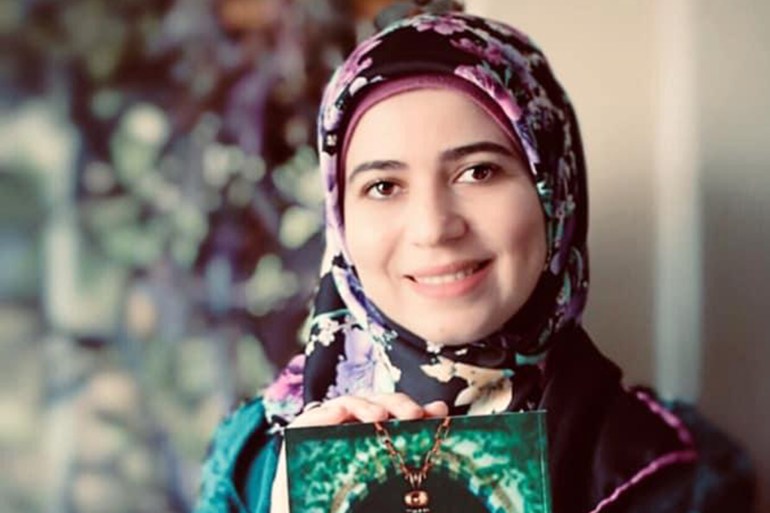ISTANBUL -
On the threshold of memory, a green citrus tree stood in the yard of a house in which the stones of the Levant mixed with the scents of ancient Jerusalem to tell about those who are still here or there and even those who have traveled.
It is a 50-year-old story that Ya'rob has spent in unknown absence since he took up his arms and volunteered to fight in defense of Palestine in 1967.
In the presence of his absence, a lot changed, countries and generations were born, and others moved, including his wife Soraya, to whom “Yarub” returned. He found nothing of her traces except a necklace that each of the spouses kept a copy of, and letters Soraya wrote to protect herself in the shadow of “Yarob” from the insomnia of the terrible dimension. .
As for "Sarah", the granddaughter of "Yarub" and "Thuraya", she is a young journalist who has been living in the Levant and working in the file of searching for the Syrian soldiers who were lost in the wars with Israel. His return may relieve him of the loneliness of attendance after a long absence.
Love and war messages
Yarob, Soraya and Sarah;
They are symbolic heroes who embody the lives of many Arab families in their interactions with the issue of Palestine before they play the starring role in the novel "Letters of Love and War between Jerusalem and Damascus", the first novel by Palestinian writer Rama Jamal.
The novel, which was published by the "Arab House of Science Publishers" in Beirut, bears many details of the Palestinian and Syrian environment, and focuses largely on the commonalities of man and place between the two countries.
The novel “Love and War between Jerusalem and Damascus” flew in the space of the Sixth International Arab Book Fair, which opened in the Turkish city of Istanbul on the ninth of this October and lasted until the 17th of the same month. Including those that were intended for distribution and gifting at the signing ceremony that was supposed to take place last Friday before it was not possible to do so because copies were exhausted.
The author, who works as an engineer and resides in Jordan and is from Bisan in occupied Palestine in 1948, says that the great demand for the novel lies in the fact that her idea is inspired by the reality of Arab families and their interactions with the Palestinian cause.
Lesser Damascus
As the paper novel embodied the similarity of feelings, concepts and values, the author presented a new embodiment of the unity of the spatial situation between Syria and Palestine by presenting her novel in a cinematic dress called "Naranj".
The necklace is a symbol of continuity in the movie, which passed from grandfather to granddaughter (social networking sites)
In just 8 minutes, the silent film presents the similarities between the Syrian capital, Damascus, and the Palestinian city of Nablus, which the Palestinians call "Little Damascus."
The film also embodies the spirit of steadfastness and resistance in the two cities, whose sons are similar in dialect, behavior, even in facial features, and in the rituals of sadness and joy, which are evident on the face of the granddaughter Sarah, as she opens a box of ornate wood from which the grandparents’ necklaces come out and wears them as if she is recreating the novel its first biography.
Rama Jamal - who took over the task of preparing the script and directing in her first cinematic experiences as well - says that she chose to express her novel in a short film as a way to introduce the novel and convey its brief idea to the audience through the eye.
She added - in an interview with Al Jazeera Net - that the film deals with the generalities of the novel and its joints without diving into its many details, explaining that the idea of turning the novel into a short film was born during her visit to the city of Nablus, which saw in its old city many parts similar to Damascus and others similar to Jerusalem.
Engineer Rama Jamal presents her novel "Letters of Love and War between Jerusalem and Damascus" (social networking sites)
She explained that she chose the silent background for her film, which is devoid of all sound except the background of the music, to overcome language barriers and make the film available to audiences speaking all languages, noting that she wanted to turn the novel into a dramatic work scenario in which she was cooperating with the late Syrian director Hatem Ali, before turning His death between her and the realization of that endeavor.
simple capabilities
The Naranj film received remarkable attention from the Arab audience, observers and critics during its screening as part of the cultural events accompanying the Sixth International Book Fair.
Muhammad Khair said that the film, which was produced with local capabilities and with a first experience, and whose production cost did not exceed 1500 dollars, did not lack the elements of attraction and suspense, and that despite his silence he succeeded in conveying the feelings of his characters to the audience.
The Syrian observer - in an interview with Al-Jazeera Net - explained that the film won a great deal of success in presenting the details about the old lanes of the Levant and about the value of sacrifice for the sake of the homeland and the dream of returning to it, especially since the links between Jerusalem and Damascus enjoy sanctity in the mind of the Arab person, according to his expression.

